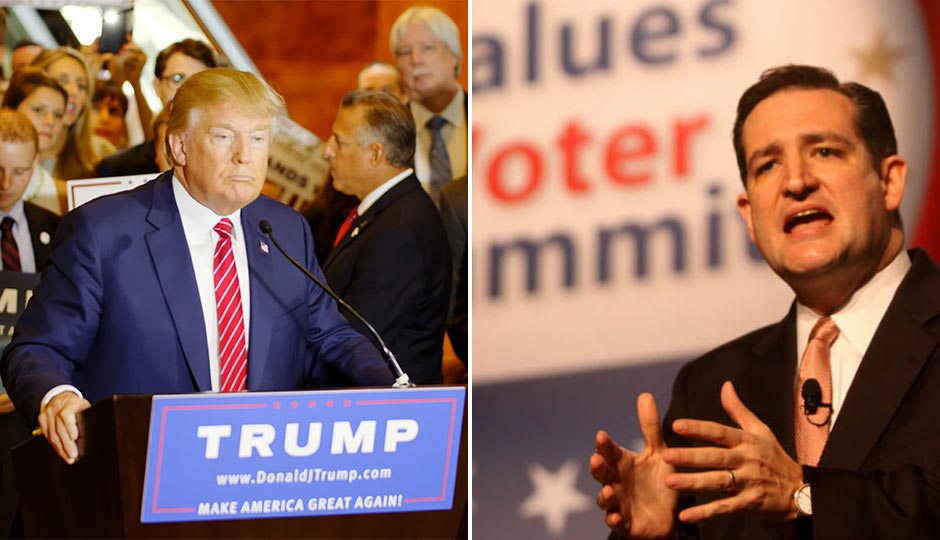Philly Latinos React as Donald Trump Becomes the Face of the GOP

Donald Trump (left) is the GOP’s presumptive nominee now that Ted Cruz (right) has bowed out. Trump photo by Michael Vadon, Creative Commons. Cruz photo by Gage Skidmore, Creative Commons
You may not have heard much about Ted Cruz’s Latino roots during his campaign, but the fact is that “Felito” (a shortened version of Rafaelito, the diminutive of his given name) accomplished what no other Latino candidate — Republican or Democrat — has ever accomplished in U.S. politics. He won the Iowa Caucus, and then he won Texas, Utah, Kansas, Alaska, Idaho, Oklahoma, Maine … you get the point. Without being popular at all with the Latino electorate, Cruz nevertheless broke ground for Latino politicians before his run came to an end last night in Indiana.
Now that John Kasich has also bowed out, that leaves the GOP — which started the election season with two viable Latino candidates — with a presumptive nominee, Donald Trump, who opened his campaign by insulting and criminalizing Mexicans and other Latinos.
The reaction of Latinos in Philadelphia ranges from those who see Trump’s now solo status as a GOP candidate as a victory of xenophobia and racism in the party, to those who see little actual difference between Cruz and Trump.
“The Republican Party is a victim of its own ill-intentioned policies,” said Maria Serna, a Colombian immigrant and Philadelphia activist. “Because of the party’s intolerance, it has allowed xenophobia and fascism to come to represent it.”
Theresa Conejo, a member of the PA Latino Democratic Caucus, prefers to focus on the so-called “Trump effect.”
“What happens next will be a test of character of all voters — Republican, Democrat, and independent,” Conejo said. “It will determine whether we move forward as one nation or splinter at the hands of one man’s narcissism and divisiveness.”
But for Philadelphia attorney Caroline Cruz (no relation to the candidate), the suspension of Cruz’s campaign is relatively meaningless.
“Since the anti-Latino policies of the two candidates are very similar it’s not a significantly different day,” she said. “Like yesterday, this election poses an urgent challenge to register to vote and organize politically across the country, to connect our resources and struggles from Chicago to El Paso and Philadelphia to Los Angeles.”
The fear of what a GOP-backed Trump represents for the Latino electorate, however, finds expression across the nation and across generations.
“We live in dangerous times,” said Michael Sedano, 71, a retired corporate executive from Pasadena, Calif., and a co-founder of La Bloga, the nation’s oldest Chicana-Chicano literary blog. “Rafael Cruz, or ‘Ted’ as he preferred, wasn’t preferred by GOP voters across the country. Instead, the party elevates a man even less qualified than Cruz to be its presumptive nominee.”
South Texan teacher, J.A. Olivarez, 33, is more blunt. “I am actually kind of freaked about Trump being so ahead,” she said. “The most dangerous thing about Cruz dropping out is how the discourse seems to be dismantling. We no longer listen to issues and have become fixated on scapegoating an entire demographic based on blustering anger and misinformation.”
Philly’s Cruz argues that what Latinos need at this moment in the electoral cycle is an unwavering focus on the issues.
“It is important to see the vested interest of major media conglomerates who may be inclined to prop up a candidate in the interest of developing a media-generated horse race,” she said. “Our eyeballs have been commoditized. Some argue that this business interest in viewership is part of what has gotten us here. Seeing past the fog of wall-to-wall Trump coverage and remaining laser focused on Latino justice policy agenda was, and is, our challenge.”
Sabrina Vourvoulias is an award-winning columnist with bylines at The Guardian US, AL DÍA News, Tor.com and Strange Horizons. Her novel, Ink, was named one of Latinidad’s Best Books of 2012. Follow her on Twitter @followthelede.


